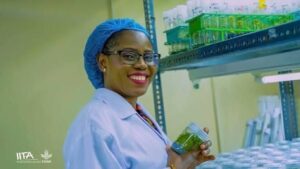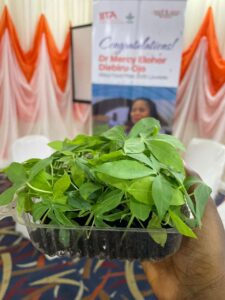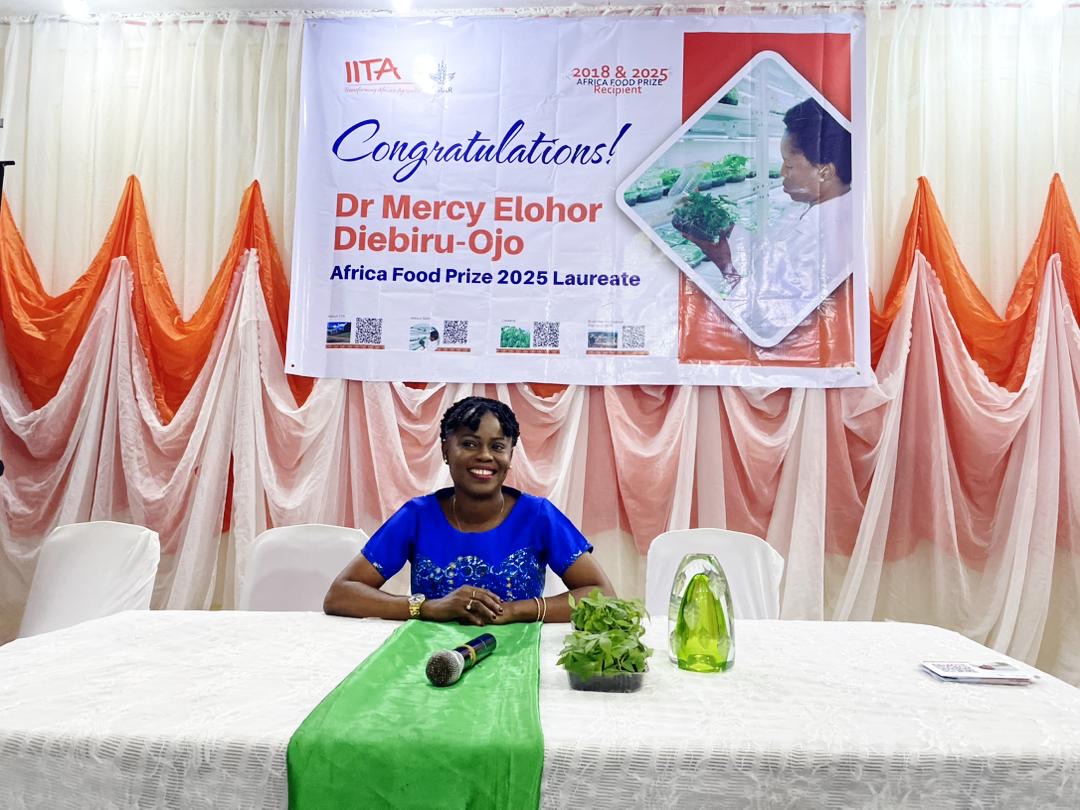“This award is not the end, it is a beginning, a call to action and a reminder that much remains to be done if we are to achieve a food-secure Africa,” says Dr. Mercy Diebiru-Ojo
By Mariya Shuaibu Suleiman
The International Institute of Tropical Agriculture (IITA), a member of CGIAR, has celebrated one of its own, Dr. Mercy Diebiru-Ojo, after she was named one of the 2025 Africa Food Prize laureates for her pioneering work in cassava and yam seed systems.
Dr. Diebiru-Ojo, a scientist with IITA, was honoured for developing and scaling the Semi-Autotrophic Hydroponics (SAH) technology, popularly known as cassava-in-a-box, which is transforming food security across Africa by providing farmers with high-quality, disease-free planting materials at scale.
The announcement was made earlier this month at the Africa Food Systems Forum in Dakar, Senegal, where she was named co-laureate alongside Professor Mary Abukutsa-Onyango of Kenya, a leading advocate for indigenous African vegetables.
At a media briefing, IITA Director General, Simeon Ehui described the recognition as a milestone for African-led innovation.
“SAH is not theory; it’s an operational breakthrough now deployed with partners to move improved varieties faster and more reliably to farmers. Mercy embodies the best of IITA: scientific rigour, entrepreneurial drive, and deep commitment to farmer impact,” Ehui said.
He stressed three ways the award matters: faster responses to pests and climate shocks, higher yields that strengthen household resilience, and a model for partnerships between research systems, seed companies, farmer organisations, and donors.
“It aligns with Africa’s vision of self-sufficiency in food production and addresses hunger, poverty, and unemployment among smallholder farmers,” he added.
Speaking to newsmen, Dr. Diebiru-Ojo reflected on what the honour meant to her.
“This award is not the end, it is a beginning, a call to action and a reminder that much remains to be done if we are to achieve a food-secure Africa,” she said.
She explained that SAH technology was designed to be affordable for smallholder farmers.

“For the average Nigerian, cassava in a box costs about ₦800, providing roughly 25 plants. While there’s a cost, farmers see the value in the quality of what they buy and keep returning because the planting materials are reliable and high-yielding,” she explained.
According to Dr. Diebiru-Ojo, cassava and yam feed millions of Africans and support local industries, but their production has long been hampered by disease-prone planting materials, slow multiplication, and limited access to improved varieties. Traditional propagation methods take 10 to 12 months, and recycled stems often carry viruses and bacteria that reduce yields.
She said the SAH technology shortens this process, multiplying clean, disease-free plants and giving farmers a faster, more reliable path to higher yields and sustainable agriculture.
She added that the innovation is now applied in countries including Nigeria, Togo, Tanzania, Rwanda, Uganda, Zambia, Malawi, Angola, Liberia, Sierra Leone, Mali, Democratic Republic of Congo amongst others.
“In Nigeria alone, we have 5 facilities. Vice President Kashim Shettima is also interested. We are setting up two facilities for him—one in Abuja and another in Borno, which he wants to use to empower farmers,” she said.
In his remarks, Prof. Chiedozie Egesi, Executive Director of the National Root Crops Research Institute (NRCRI), said partnerships are key to taking innovations to farmers.
“This prize is proof of what strong collaborations can achieve. We have over 5,000 cassava seed entrepreneurs across Nigeria, and our next step is to build their capacity to produce high-quality cassava and yam planting materials,” he said.
Mr Ehui commended the award committee for recognising two women innovators in 2025, calling it “a powerful message about the future we are building.”



